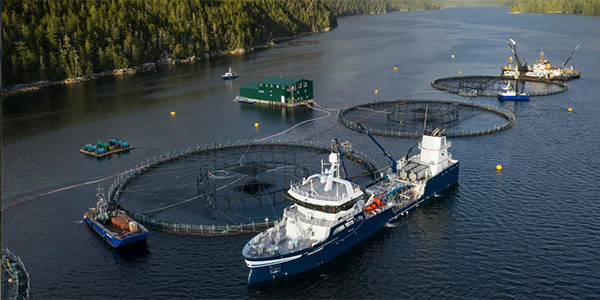Five years ago, with wild salmon in sharp decline, the federal government promised a transition away from open-net farming. As the clock ticks towards a 2025 deadline, wild salmon advocates worry Ottawa is back-peddling
||| FROM THE NARWHAL |||
Along the west coast of British Columbia, dozens of fish farms are raising salmon in what are known as open-net pens. Each pen can contain hundreds of thousands of fish — largely non-native Atlantic salmon that are doused with pesticides and given antibiotics when sea lice or disease are present.
Now, a deadline is looming for the federal government to release its promised plan to transition away from open-net pen salmon farms in B.C.
One First Nation is taking the federal department that oversees the farms, Fisheries and Oceans Canada, to court, while close to 100 nations have expressed frustration with the federal government’s sluggish response to threats facing wild salmon, including disease, habitat loss and climate change. They accuse Fisheries and Oceans Canada of breaking promises, making decisions based on inaccurate science and putting industry priorities ahead of the health of wild Pacific salmon stocks.
At the same time, proponents of fish farms say modernizing practices — such as using integrated pest management to tackle sea lice — can help reduce risk to wild salmon. They’re asking for fish farm licence extensions of up to six years to put those practices into place.
Last year, then-federal fisheries minister Joyce Murray shuttered fish farms in the Discovery Islands, a group of islands between Vancouver Island and the mainland, as a precaution to protect the health of wild salmon. Further north, multiple fish farms in the Broughton Archipelago had already closed following an agreement between First Nations and the B.C. government. The remainder closed last year after Broughton First Nations (ʼNa̱mǥis, Kwikwasut’inuxw Haxwa’mis and Mamalilikulla) withdrew consent for the farms to operate in their territories.
But that still leaves dozens of open-net pen salmon farms in operation in B.C. All 85 fish farm licences are set to expire at the end of June — and holders of 66 licences are seeking renewal.
In May, ʼNa̱mǥis First Nation announced it is resuming a 2019 lawsuit against Fisheries and Oceans Canada (DFO) in an effort to compel the department to test salmon for disease before stocking open-net pen farms in B.C.
“The ʼNa̱mǥis has lost all faith in the DFO, the minister and the prime minister to implement the prime minister’s mandate to remove the net pen feedlots from British Columbia waters. We believe the only way to protect our rights and the wild salmon is to go back to court,” ʼNa̱mǥis First Nation Chief Victor Isaac said at a May press conference. “We will again prove that the DFO’s consultation with us was a sham and they ignored the peer-reviewed policy science.”
Fisheries and Oceans Canada has yet to release any details about a transition plan. In April, Fisheries Minister Diane Lebouthillier told Ha-Shilth-Sa, Canada’s oldest First Nations newspaper, that no aquaculture facilities will be forced to close in 2025.
**If you are reading theOrcasonian for free, thank your fellow islanders. If you would like to support theOrcasonian CLICK HERE to set your modestly-priced, voluntary subscription. Otherwise, no worries; we’re happy to share with you.**








“Friends don’t let friends eat farmed salmon.”